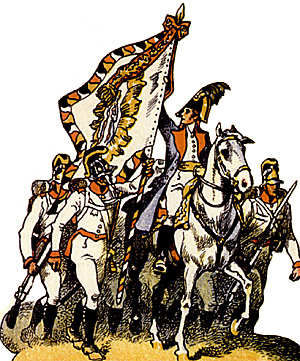
The Austrian archduke, Karl (better known as Charles in the English-speaking world), was the fifth child of the Holy Roman Emperor Leopold II, and brother of Franz (Francis) II. Raised as a soldier, he became Austria's most capable commander, perhaps best known for administering Napoleon's first major defeat at Aspern-Essling in May 1809. He served throughout the French Revolutionary period, commanded a brigade at Jamappes in 1792, an army corps in 1794, became a field marshal in 1796, and led his Army of the Rhine to a series of victories that won him acclaim as the "savior of Germany."
Sent too late to rescue the Austrian position in Italy in 1797, Karl was unable to stop General Bonaparte's advance toward Vienna, his first contact with Napoleon. In 1799, he again led Austrian forces to victories along the Rhine, but due to reasons of health, difficulty of cooperation with Russia, and political interference from Vienna, he had himself relieved by February 1800. Untainted by the military disasters which befell Austria, Karl was recalled to reform the army in 1801. His efforts met with only mixed success against the entrenched conservatism of the Viennese court.
Averse to a new war, he commanded in Italy in 1805, gaining the campaign's only Austrian victory at Caldiero. From 1806, as commander-in-chief, he pushed broader military reform. Still believing Austria unready for war, he reluctantly commanded the army in 1809, defeating Napoleon outside of Vienna in May. (One of the famous incidents where Karl rallied a regiment is shown below.) Napoleon's victory at Wagram in June brought an end to the war and Karl's subsequent resignation. Just over 5 feet tall and mildly epileptic, Karl was a product and captive of an innately conservative empire intensely concerned with dynastic preservation. His military reforms, which went far to strengthening Austria's military, were perhaps his greatest contribution to the war against Napoleon.
More Powers of the Napoleonic Era
- France
Great Britain
Duke of Wellington Profile
Austria
Archduke Charles Profile
Russia
Field Marshal Kutusov Profile
Prussia
Field Marshal Blucher Profile
Spain
The Peninsula War
Ottoman Empire
Minor Powers
Back to Table of Contents -- Napoleon #17
Back to Napoleon List of Issues
Back to MagWeb Master Magazine List
© Copyright 2001 by Napoleon LLC.
This article appears in MagWeb (Magazine Web) on the Internet World Wide Web.
The full text and graphics from other military history magazines and gaming magazines are available at http://www.magweb.com
Order Napoleon magazine direct